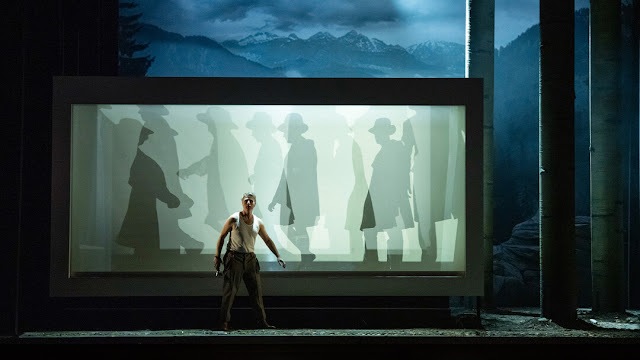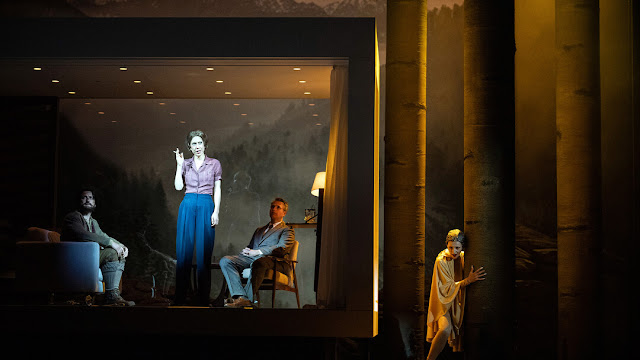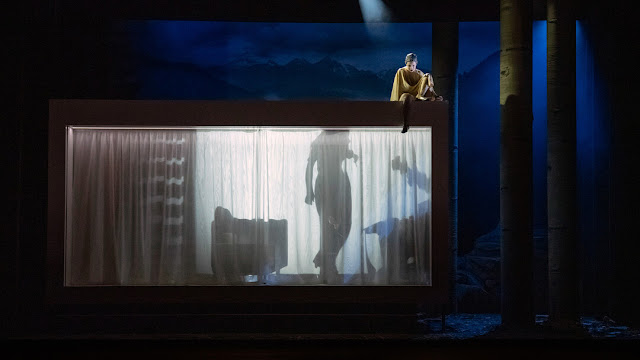 |
| Judith Weir: Blond Eckbert – English Touring Opera |
Do not take my story for a fairytale, Judith Weir: Blond Eckbert; Abigail Kelly, Amy J Payne, Matthew McKinney, Mark Nathan, Aoife Miskelly, Flor McIntosh, William Morgan, Alex Otterburn, conductor: Gerry Cornelius, director: Robin Norton Hall; English Touring Opera at Hackney Empire
Reviewed 5 October 2024
A brilliant reinvention of Judith Weir’s opera places a modern interpretation of German Romanticism at the centre of this intriguing and thought-provoking programme, full of terrific performances all round
The reworking, reinterpretation and repurposing of folk tales is at the centre of English Touring Opera‘s Autumn season. Things opened last week at the Hackney Empire with Rimsky Korsakov’s The Snow Maiden (which we will be covering in a few weeks’ time), alongside a new opera by Joanna Marie Skillett and Tatty Hennessy, The Wellies based on a Hans Christian Anderson fairy tale. The Wellies is a highly participatory, sensory and interactive piece for audiences with Special Educational Needs and Disabilities (SEND) and early years audiences and is touring to special schools, libraries and studio theatres.
The final element in the tour opened at Hackney Empire on Saturday 5 October 2024, a double bill which paired a new pasticcio, Do not take my story for a fairytale performed by Abigail Kelly, Amy J Payne, Matthew McKinney and Mark Nathan, with Judith Weir‘s Blond Eckbert performed by Aoife Miskelly, Flora McIntoch, Will Morgan and Alex Otterburn. The conductor was Gerry Cornelius and the director was Robin Norton-Hale with designs by Eleanor Bull. Both works took early German romanticism as their starting point, with the pasticcio using the music and words of early German romanticism with its folk-influences, and Judith Weir’s opera being based on a story by Ludwig Tieck, one of the founders of German romanticism.
 |
| Judith Weir: Blond Eckbert – English Touring Opera |
Judith Weir’s Blond Eckbert premiered at English National Opera in 1994, but in 2006 Judith Weir created a pocket version, scored for just ten players and with the piece slightly cut and lasting around an hour. When I saw Blond Eckbert at the London Coliseum the work felt somewhat lost in those wide-open spaces, and the rather elliptical nature of the story telling seemed puzzling. However, the pocket version of the work has more recently gained some currency, particularly in German-speaking areas where the work of Ludwig Tieck has more resonance.
Eleanor Bull’s evocative backdrop reflected the look of German romanticism, but Eckbert and Berthe’s house was determinedly modern and not a little stylish, and the action reflected this dichotomy. Some of the setting details, from the libretto, for the later acts where ignored and the whole had a rather compressed feel, as if the text was not giving everything away. Again we come to the laconic, elliptical nature of Judith Weir’s story telling, and Robin Norton-Hale’s production really leaned into this. What came over from the first was the way that Weir’s music, the instrumental music, provided far more information than the text. From the very opening, the sound of the instrumental ensemble under Gerry Cornelius was terrifically vivid, as if the reduction to ten instruments had clarified things. Whilst in the opening scene the words tell us that Eckbert and Berthe’s were content, the music said otherwise and the wondrously nervy performances from Alex Otterburn and Flora McIntosh leaned into this, music and gesture telling far more than mere words.
In Weir’s version of the story the magical Bird (Aoife Miskelly) is something of a narrator and Miskelly gave an engaging performance, perched on the top of the house for much of the opera’s first half. She was finely communicative yet not quite giving everything away, a bit gnomically mysterious, in the way of this opera, yet entrancing in the way she dashed off the vocal roulades. A magical performance.
Alex Otterburn’s Eckbert seemed driven from the word go, as if he had an inkling of the terrible secret that he and Berthe harboured. This was a finely nervy performance, and after his killing of William Morgan’s Walter, Otterburn went to pieces by withdrawing into himself. As his wife, Berthe, Flora McIntosh looked wondrously stylish and was expressive even in the long opening section where she sang little, but then her narration, telling the story of her youth, was telling, pregnant with supressed feeling and hidden complexities. William Morgan’s Walter, who sets his character up via a marvellous moment describing his arrival through the mountains, leaning into the German Romantic image, managed to be provoking yet vividly drawn, knowing far more than we realised. Morgan nicely incarnated the other characters, Hugo and the Old Woman, and we only learn at the end that all are the same.
The ending was shattering, all the more powerful because Weir’s characters are numb and it is in the orchestra that the provides the violence.
Having found the work puzzling in 1994, I found this compressed version far more telling. The terrific performances from Cornelius and the instrumental ensemble really brought the story out and the modern elements in Robin Norton-Hall’s production seemed to draw the work’s gnomic, laconic elements together. This was a remarkable re-invention and I hope that it presages other reinventions from ETO, though the first-night audience was perhaps more sparse than was desirable.
 |
| Judith Weir: Blond Eckbert – Aoife Miskelly – English Touring Opera |
In the first half we had a work whose title, Do not take my story for a fairytale was drawn from Weir’s libretto. It consisted of a sequence of numbers, with orchestrations by Gerry Cornelius and Robin Wallington, as four characters, Abigail Kelly, Amy J Payne, Matthew McKinney and Mark Nathan, wandered around a romantic landscape. It was the music and the text that mattered here, some of the pieces quite rare, but dramatically this was figures in a landscape and we only had real drama towards the end.
First came Abigail Kelly in CPE Bach’s sacred cantata, Klopstock’s Morgengesang am Schöpfungsfeste, then Mark Nathan embodied Schubert’s Prometheuos, followed by Kelly in Haydn’s aptly named aria Solo e pensoso. Matthew McKinney was the wandering poet, singing a section of Beethoven’s An die ferne Geliebte, then Amy J Payne injected some real needed drama with the scene La Tempesta by the Viennese composer Marianna Martines. Here she and Kelly interacted dramatically and finally these became characters, not figures in a landscape. We ended with the four singers together in Schubert’s Viel tausend Sterne prangen.
This was an intriguing concept and clearly a lot of thought had gone into it, particularly selecting the music and the words. Perhaps it would have helped if we had had more information in the programme (the articles concentrated on Blond Eckbert), but the four singers were all engaging and ardent.
The blog is free, but I’d be delighted if you were to show your appreciation by buying me a coffee.
Elsewhere on this blog
- A glorious noise: from one to eight choirs in I Fagiolini’s evening of music from 17th-century Venice and Rome – concert review
- After the humans are gone, the instruments still sing and it is important to listen – Jake Heggie on his song cycle, Intonations: Songs from the Violins of Hope – interview
- Innate theatricality: composer Adrian Sutton definitively moves out of the theatre with a challenging yet engaging concerto for violinist Fenella Humphreys – record review
- Eternity In An Hour: Keval Shah and Jess Dandy on their unique reimagining of the Bhagavad Gita – feature
- A focus on the flute: London Handel Players in a group of cantatas Bach wrote in 1724 with virtuoso flute parts – concert review
- A special treat: strong individual performances & superb ensemble in WNO’s revival of Puccini’s Il trittico – opera review
- Embodied sound: Zubin Kanga on his innovative approach to new technology through his interdisciplinary musical programmes – interview
- Compelling performances: Stephen Hough, YL Male Voice Choir, Santtu-Matias Rouvali and the Philharmonia – concert review
- Investing in the magic of Purcell’s music: The Fairy Queen from The Sixteen at Cadogan Hall – opera review
- High-quality music-making & imaginative programming in the special natural setting of Exmoor & Dartmoor: I chat to Tamsin Waley-Cohen of the Two Moors Festival – interview
- Home









